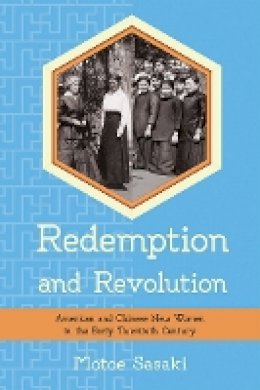
Redemption and Revolution: American and Chinese New Women in the Early Twentieth Century
Motoe Sasaki
In the early twentieth century, a good number of college-educated Protestant American women went abroad by taking up missionary careers in teaching, nursing, and medicine. Most often, their destination was China, which became a major mission field for the U.S. Protestant missionary movement as the United States emerged to become an imperial power. These missionary women formed a cohort of new women who sought to be liberated from traditional gender roles. As educators and benevolent emancipators, they attempted to transform Chinese women into self-sufficient middle-class professional women just like themselves.
Motoe Sasaki shows in Redemption and Revolution how these aspirations ran parallel to and were in conflict with those of the Chinese xin nüxing (New Women) they encountered.The subjectivity of the New Woman was an element of global modernity expressing gendered visions of progress. At the same time it was closely intertwined with the view of historical progress in the nation. Though American and Chinese New Women emphasized individual autonomy in that each sought to act as historical agents for modern progress, their notions of subjectivity were in different ways linked to the ideologies of historical progress of their nations. Sasaki's transnational history of these New Women explores the intersections of gender, modernity, and national identity within the politics of world history, where the nation-state increased its presence as a universal unit in an ever-interconnecting global context.
Product Details
About Motoe Sasaki
Reviews for Redemption and Revolution: American and Chinese New Women in the Early Twentieth Century
K. E. Stapleton, State University of New York at Buffalo
CHOICE
Sasaki's research provides new insights into the complex forces guiding both American missionary women and Chinese New Women across the first half of the twentieth century. The author adds to a growing body of scholarship that challenges critics of cultural imperialism who tend to paint American missionary women as little more than extensions of the nation-state, capitalism, and Western imperialism.... Rich in research and sharp in its analysis, Redemption and Revolution adds to our understanding of the complex and often conflicted relationships American missionary women had with the nation-states they represented abroad.
Sarah M. Griffith
American Historical Review
Sasaki demonstrates that American and Chinese New Women struggled to make sense of how they were markers of their respective nations' progress.
Journal of American History
